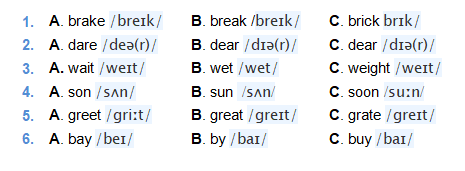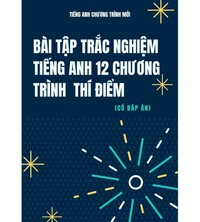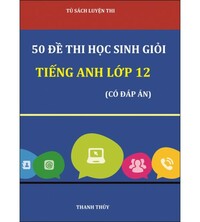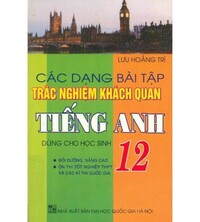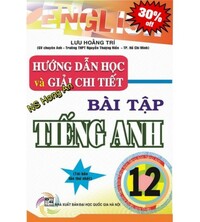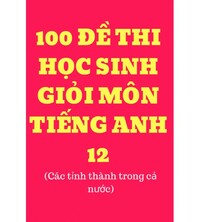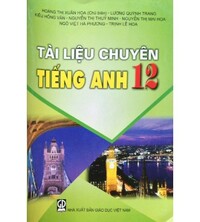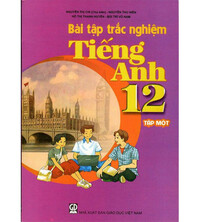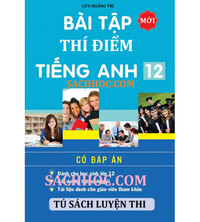Looking back - trang 16 Unit 1 SGK tiếng anh 12 mới
Tick the word that does not have the same sound as the other two.
Phát âm
Task 1. Tick the word that does not have the same sound as the other two.
(Đánh dấu vào những từ mà không phát âm tương tự như hai phần còn lại.)
Đáp án:
|
1. brick |
2. dare |
3. wet |
|
4. soon |
5. greet |
6. bay |
Task 2. Listen and write the correct homophones to complete the sentences.
(Nghe và viết các từ đồng âm đúng để hoàn thành câu.)
Click tại đây để nghe:
1. We need more _______ for the campfire. ______ you be able to bring some?
2. l get really ________ with playing the same ________ games every day.
3. The _______ forecast is for more rain, so I'm not sure we can go hiking tomorrow.
4. There was a big_______ in her sock, so the ________ of her big toe was sticking out.
Đáp án
1. wood, Would
2. bored, board
3. weather, whether
4. hole, whole
Script
1. We need more wood for the campfire. Would you be able to bring some?
(Chúng ta cần nhiều gỗ để làm lửa trại. Bạn có thể mang một ít không?)
2. I get really bored with playing the same board games everyday.
(Tôi thực sự buồn chán khi chơi cùng một trò chơi mỗi ngày.)
3. The weather forecast is for more rain, so I'm not sure whether we can go hiking tomorrow.
(Dự báo thời tiết là mưa nhiều hơn, vì vậy tôi không chắc chắn liệu ngày mai chúng ta có thể đi bộ được không.)
4. There was a big hole in her sock, so the whole of her big toe was sticking out.
(Có một cái lỗ lớn trong tất của cô ấy, vì vậy toàn bộ ngón chân cái của cô ấy nhô ra.)
Từ vựng
Task 1. Complete the sentences with the correct form of the words or phrase in the box.
(Hoàn thành câu với các hình thức đúng của các từ hoặc cụm từ trong khung.)
|
achievement historical figure distinguished reputation respectable dedication |
1. Naming streets after___________is a common practice around the world.
2. After winning the MasterChef competition, Christine Ha gained a(n) ___________ as a first-class cook.
3. You'll look more __________ if you wear a nice suit and a tie.
4. No one can deny his hard work and ________ to the club.
5. After a series of successes, she won a lifetime ______ award for music.
6. Nguyen Trai had a(n) _______ career as a skilled strategist and prominent scholar.
Đáp án
|
1. historical figure |
2. reputation |
3. respectable |
|
4. dedication |
5. achievement |
6. distinguished |
Giải chi tiết
1. Naming streets after historical figure is a common practice around the world.
- name sth after sth: đặt tên theo cái gì
Chỗ trống cần điền 1 danh từ.
- historical figure: nhân vật lịch sử.
Tạm dịch: Đặt tên con đường theo tên của nhân vật lịch sử là thực tế phổ biến trên khắp thế giới.
2. After winning the MasterChef competition, Christine Ha gained a reputation as a first-class cook.
Sau mạo từ cần điền 1 danh từ
- reputation (n): danh tiếng ; gain reputation: tăng danh tiếng, nổi tiếng.
Tạm dịch: Sau khi chiến thắng cuộc thi Vua đầu bếp, Christine Ha đã giành được danh tiếng là đầu bếp hạng nhất.
3. You'll look more respectable if you wear a nice suit and a tie.
more + adj: so sánh hơn
- respectable (adj): đáng kính trọng
Tạm dịch: Bạn sẽ trông đáng kính trọng hơn nếu bạn mặc một bộ vest đẹp và đeo cà vạt.
4. No one can deny his hard work and dedication to the club.
Sau tính từ sở hữu his là danh từ, từ cần điền phải đồng dạng với danh từ trước and tức là nó cũng phải là danh từ
- dedication (n): cống hiến
Tạm dịch: Không ai có thể phủ nhận sự chăm chỉ và cống hiến cho câu lạc bộ của anh ấy.
5. After a series of successes, she won a lifetime achievement award for music.
- Cụm từ: lifetime achievement award: giải thưởng thành tựu trọn đời.
Tạm dịch: Sau hàng loạt các thành công, cô ấy đã đạt được giải thưởng thành tựu trọn đời cho âm nhạc.
6. Nguyen Trai had a distinguished career as a skilled strategist and prominent scholar.
Sau mạo từ a và trước danh từ career thì cần điền 1 tính từ.
distinguished: (adj) phân biệt, đặc trưng, đặc biệt
Tạm dịch: Nguyễn Trãi có một sự nghiệp đặc biệt như một nhà chiến lược tài ba và một học giả nổi tiếng.
Ngữ pháp
Task 1. Read the following story about Tran Quoc Toan. Put the verbs in brackets in the past simple or the past continuous.
(Đọc câu chuyện sau đây về Trần Quốc Toản. Chia động từ trong ngoặc ở thì quá khứ đơn hoặc quá khứ tiếp diễn.)
Marquis Hoai Van Tran Quoc Toan (1. be) _____ born in 1267. In 1279, Kublai Khan of the Mongol Empire (2. begin)______________ his attempt to take over Dai Viet and Champa. Facing threat fro the north, in October 1282, Dai Viet's Emperor (3. gather) _________ all members of the royal family and officials in the royal court to discuss ways to defend the country. The 15-year-old Tran Quoc Toan (4. be)___________ not invited to the assembly because he was too young. He (5. become) _____ very upset. As (6. shout)_____ angrily outside the royal court, the emperor (7. come) out and (8. give)____ him an orange.
He also (9. order) __________ the young marquis to go home. While the emperor and the officials (10. discuss) the war strategies, Tran Quoc Toan (11. still, wait) outside the hall. He (12. get) ________ so upset and stimulated that he (13. crush)__________ the orange with his own hand. Later he (14.begin) ______ forming his own army and (15. manage) __________ to recruit over one thousand soldiers. While his troops (16. fight) ___________ against the Mongol army, he (17. always, dash) _____________ to the front to drive the enemies back. His death was unknown, but today Tran Quoc Toan is considered one of the finest examples of Vietnamese patriotism, especially for the young generation.
Đáp án
|
1. was |
2. began |
3. gathered |
4. was |
|
5. became |
6. was shouting |
7. came |
8. gave |
|
9. ordered |
10. were discussing |
11. was still waiting |
12. got |
|
13. crushed |
14. began |
15. managed |
16. were fighting |
|
17. was always dashing |
|||
Giải chi tiết
Marquis Hoai Van Tran Quoc Toan (1) was born in 1267. In 1279, Kublai Khan of the Mongol Empire (2) began his attempt to take over Dai Viet and Champa. Facing threat fro the north, in October 1282, Dai Viet's Emperor (3) gathered all members of the royal family and officials in the royal court to discuss ways to defend the country. The 15-year-old Tran Quoc Toan (4) was not invited to the assembly because he was too young. He (5) became very upset. As (6) was shouting angrily outside the royal court, the emperor (7) came out and (8) gave him an orange.
He also (9) ordered the young marquis to go home. While the emperor and the officials (10) were discussing the war strategies, Tran Quoc Toan (11) was still waiting outside the hall. He (12) got so upset and stimulated that he (13) crushed the orange with his own hand. Later he (14) began forming his own army and (15) managed to recruit over one thousand soldiers. While his troops (16) were fighting against the Mongol army, he (17) was always dashing to the front to drive the enemies back. His death was unknown, but today Tran Quoc Toan is considered one of the finest examples of Vietnamese patriotism, especially for the young generation.
(1) chia to be theo số ít ở thì quá khứ đơn
(2) dấu hiệu “in 1279” => quá khứ đơn
(3) “in 1282” => quá khứ đơn.
(4) 1 sự kiện xảy ra và kết thúc trong quá khứ => quá khứ đơn
(5) 1 hành động diễn ra theo sau đó
(6+7+8) Cấu trúc As = When + S was/were V-ing, S + V-ed (1 hành động đang xảy ra thì 1 hành động khác xen vào. “came” và “gave” phải đồng dạng vì có liên kết từ “and”
(9) 1 sự việc xảy ra và kết thúc trong quá khứ => quá khứ đơn.
(10+11) cấu trúc: While S was/were V-ing, S + was/ were V-ing: 2 hành động xảy ra đồng thời
(12-15) các sự kiện xảy ra nối tiếp nhau => quá khứ đơn
(16+17) While S + was/were V-ing, S + was/were V-ing: 2 hành động xảy ra đồng thời
Tạm dịch
Hoài Văn Trần Quốc Toàn sinh năm 1267. Năm 1279 Kublai Khan của đế chế Mông Cổ bắt đầu chiếm Đại Việt và Champa. Trước nguy cơ xâm lược từ phía bắc, vào tháng 10 năm 1282, Hoàng đế Đại Việt tập trung tất cả các thành viên hoàng tộc và các quan chức trong triều đình để phân chia bảo vệ đất nước. Chàng trai 15 tuổi Trần Quốc Toản không nhận được lời mời tham dự buổi họp vì khi đó ông còn quá trẻ. Ông đã rất buồn vì điều đó. Vì vậy ông la hét giận dữ bên ngoài cung điện hoàng gia, hoàng đế đi ra và cho ông 1 quả cam.
Vua làm vậy để vị vương thất trẻ trở về. Trong khi hoàng đế và các quan chức thảo luận các chiến lược quân sự, Trần Quốc Toản vẫn đợi bên ngoài. Ông ấy nhận quả cam rất tức giận và kích động bóp nát quả cam bằng chính tay của mình. Sau đó ông ấy bắt đầu thành lập đội quân chính của mình và chiêu binh hơn một ngàn lính. Trong khi quân đội của ông chiến đấu chống quân đội Mông Cổ, ông luôn luôn tiến đánh phía trước kẻ thù để đuổi chúng về. Cái chết của ông không rõ nguyên nhân, nhưng ngày nay Trần Quốc Toản được coi là một trong những ví dụ điển hình nhất về lòng yêu nước của người Việt Nam, đặc biệt là thế hệ trẻ.
Task 2. These sentences are incorrect. Correct them, adding articles where necessary.
(Những câu sau đều không đúng. Hãy Sửa chúng, thêm mạo từ khi cần thiết)
1. We had great time in USA last summer.
2. John decided to join army and become soldier so that he could fight for country.
3. Do English drink tea or coffee at breakfast?
4. We returned from two-week holiday in Philippines and Indonesia.
5. When you go to Paris, don't forget to visit Louvre and take boat trip along Seine.
6. You'll need warm hat, new coat and pair woollen gloves for your trip to Europe this season.
7. My mother said she would go to bank on Fir Street to withdraw some money, and then she would drop by supermarket near theatre on way home.
8. In rush hour in Ha Noi, it's more convenient to travel by motorbike than to take taxi.
Đáp án
1. a (great time), the (USA)
2. the (army), a (soldier), the (country)
3. the (English)
4. a (two-week holiday), the (Philippines)
5. the (Louvre), a (boat trip), the (Seine)
6. a (warm hat), a (new coat), a (pair of woollen gloves)
7. the (bank), the (supermarket), the (theatre), the (way)
8. the (rush hour), a (taxi)
Giải chi tiết
1. We had a great time in the USA last summer.
The USA
(Chúng tôi đã có một khoảng thời gian thật tuyệt ở Mỹ vào mùa hè trước.)
2. John decided to join the army and become a soldier so that he could fight for the country.
- army và country đều đã được xác định là ở nơi John sống, còn a soldier đề cập đến số lượng.
(John quyết định gia nhập quân đội và trở thành lính để có thể chiến đấu vì đất nước.)
3. Do the English drink tea or coffee at breakfast?
- nói về ngôn ngữ thì không cần the, nhưng nói về người chung chung thì phải có mạo từ the
(Người Anh thường uống trà hay cà phê vào bữa sáng?)
4. We returned from a two-week holiday in the Philippines and Indonesia.
the Philippines
- two-week holiday: được đề cập đến ở lần đầu
(Chúng tôi trở về từ kì nghỉ hai tuần ở Philippines và Indonesia.)
5. When you go to Paris, don't forget to visit the Louvre and take a boat trip along the Seine.
- take a boat trip: đi tàu, đi thuyền
- địa danh thì cần có mạo từ the
(Khi bạn đến Paris, đừng quên ghé thăm Louvre và đi thuyền dọc theo sông Seine.)
6. You'll need a warm hat, a new coat and a pair woollen gloves for your trip to Europe this season.
- các danh từ trên đều được nhắc đến lần đầu,và được đề cập đến số lượng là 1.
(Bạn sẽ cần mũ ấm, găng tay len, áo khoác mới và chuẩn bị cho chuyến đi đến Châu Âu mùa này.)
7. My mother said she would go to the bank on the Fir Street to withdraw some money, and then she would drop by the supermarket near the theatre on way home.
- các địa điểm trên đều đã được xác định, tức là nhân vật I và my mother đều đã biết những địa điểm ấy ở đâu.
(Mẹ tôi nói rằng bà sẽ đến ngân hàng trên Phố Fir để rút một ít tiền, và sau đó bà sẽ xuống siêu thị gần rạp chiếu phim trên đường về nhà.)
8. In rush hour in Ha Noi, it's more convenient to travel by motorbike than to take a taxi.
- the rush hour: giờ cao điểm
- take a taxi: đi taxi
(Trong giờ cao điểm ở Hà Nội, đi xe máy thuận tiện hơn là đi taxi.)
Search google: "từ khóa + timdapan.com" Ví dụ: "Looking back - trang 16 Unit 1 SGK tiếng anh 12 mới timdapan.com"
